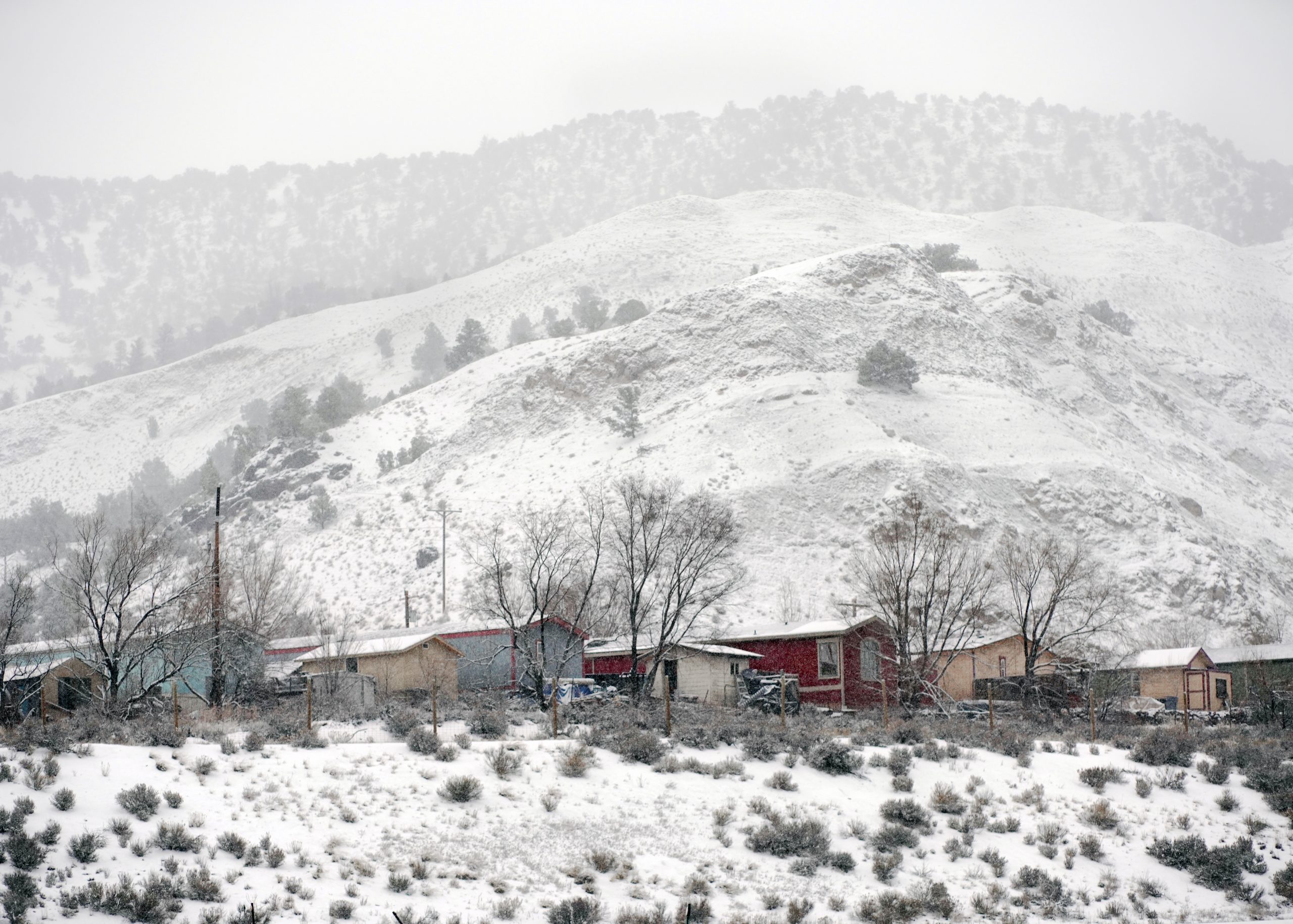April 18, 2023 | Rachel Ellis
Along the iconic drive from Denver to Glenwood Springs is the town of Gypsum, Colorado – Eagle County’s most populated municipality. And just beyond there, nestled one mile from the Dotsero Volcano, is a small fraction of Eagle County’s population who live in the Dotsero Mobile Home Park, a community of roughly 80 lots housing mostly working class families and individuals.
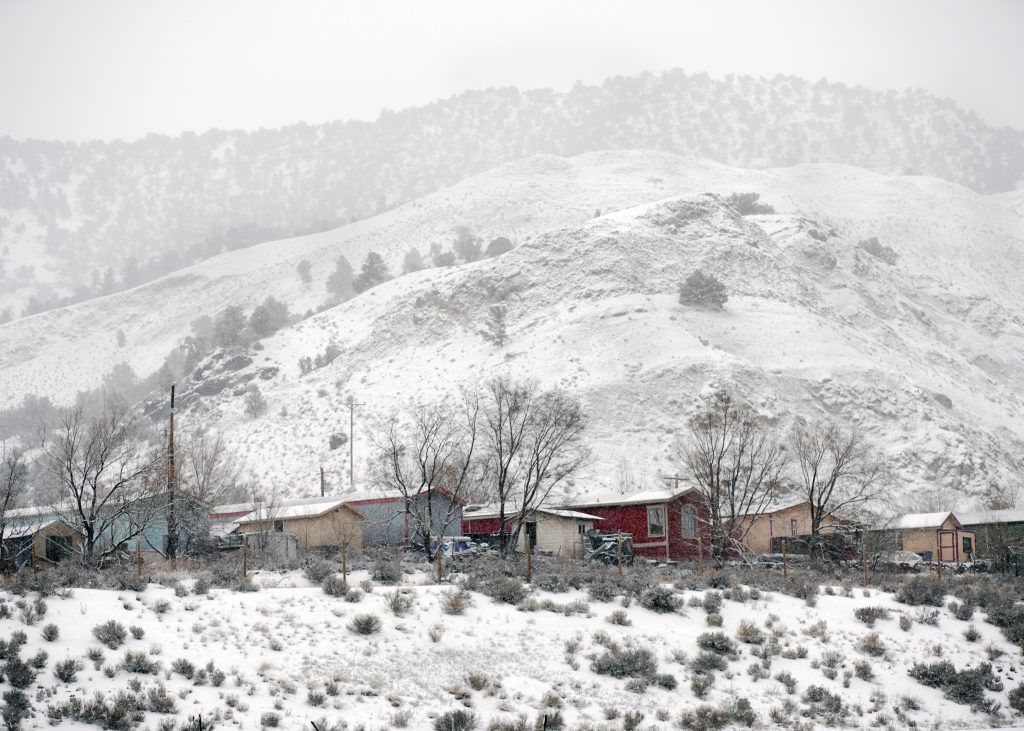
A view of The Dotsero Mobile Home Community in Gypsum, CO.
The mobile home park uses propane, a heavy and flammable gas found in crude petroleum and natural gas and stored in tanks on the outskirts of the community. Propane burns very easily, making it a convenient source of fuel and energy but also adding life-safety risks in the case of gas leaks. The cost of propane is also increasingly unaffordable for many of the Dotsero’s residents. Not to mention its history with infrastructure problems – leaky piping, old and unreliable infrastructure, unsafe drinking water, and, notably, unsafe and high-polluting heating systems.
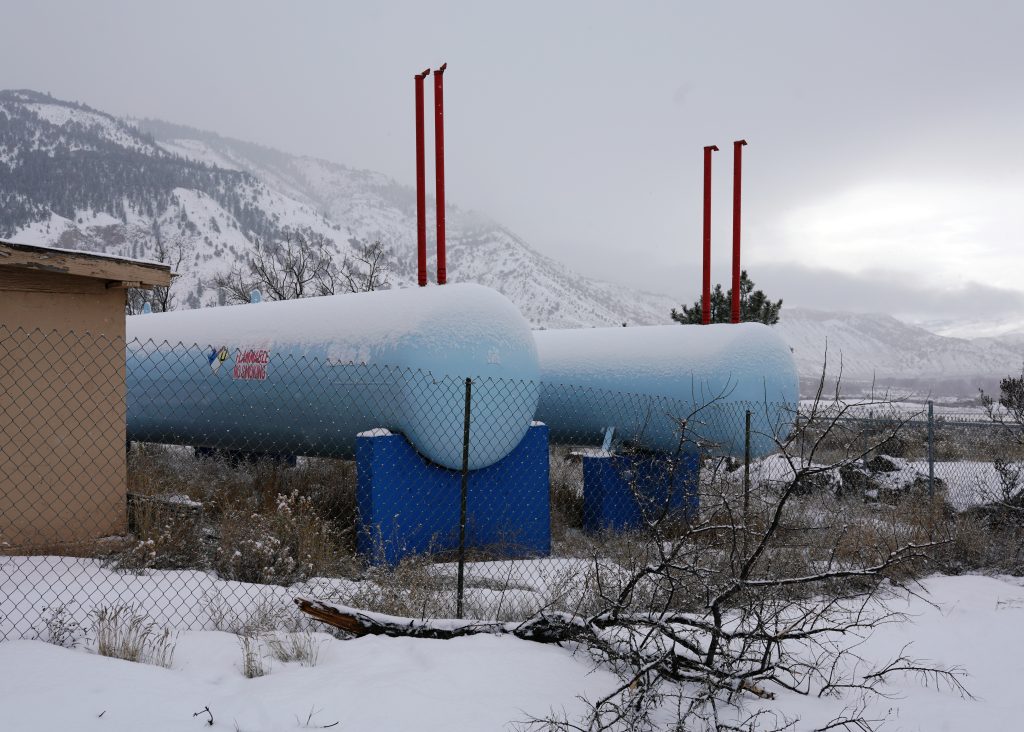
The two propane tanks positioned at the park’s entrance.
That’s no surprise to Doug Jones, the Energy Program Director at the Northwest Colorado Council of Governments (NWCCOG). Doug runs the organization’s Weatherization Assistance Program (WAP), which provides cost-effective energy efficiency upgrades to income-qualified households in 13 counties in Northwest Colorado. While traditionally the program has focused on standard energy efficiency upgrades like air sealing, weather stripping, and insulation, the pandemic gave Doug and his team an opportunity to research innovative and sustainable solutions for homes running on inefficient electric or propane heating systems too. Especially because Doug and his team see gas leaks all too often, they wanted to be able to do more for their clients.
“We had time to research air source heat pumps because we knew they were a more efficient alternative,” Doug said. “We worked with contractors like Diamond H Enterprises and DJ Electric who lended their expertise and trained our staff on how to install them.”
Upon identifying three homes in Gypsum that use propane, Doug quickly noticed a pattern – they were all in the mobile home community. After conducting an energy audit and other basic efficiency measures for these homes in the park, NWCCOG joined forces with Eagle County in 2020 to pilot the Beneficial Electrification of Eagle County Homes program (BEECH) within the Dotsero Mobile Home Community.
John Gitchell, Climate Action Manager at Eagle County, said that the county has always had a focus on weatherization and is increasingly optimistic about electrification. “We saw the opportunity to partner with NWCCOG to continue to elevate that mission,” John said. “We saw the cost savings and that’s what got us excited to work together on this.”
As BEECH was piloted, the funding portfolio was a combination of county funding and rebates from local utility Holy Cross Energy and local non-profit Walking Mountain Science Center, crucial partners that joined NWCCOG to help get BEECH started. The program got even more traction and attention thanks to a working partnership between NWCCOG and the Colorado Energy Office (CEO). Stephanie Insinna-Sahondo, Director of CEO’s WAP explained that part of her role is to connect with other states to see what they’re up to, and share best practices both into and out of Colorado. In the summer of 2021, the CEO started funding not just the weatherization updates, but beneficial electrification components that Doug was pushing to do in the mobile park.
Stephanie explained how Doug had embraced newer technology to improve home heating, like air source heat pumps, early on in their relationship. “NWCCOG has always been a recipient of WAP. Doug led the charge for wanting to do more and posed questions that demand that [the state] go above and beyond. So that led us to ask ourselves, can our program offer more? Where is funding flexible?” Stephanie said.
Doug explained how the energy office supported the development of BEECH before the monetary funding was able to come into play. “We’re a nonprofit so we do the best that we can, but having the state have our backs made the process that much better,” Doug said.
And by the end of summer 2021, the energy office was fully on board to support the holistic nature of weatherization.
“The CEO’s mission is to save people money on energy bills, and with programs like BEECH, the department gets to explore and value that part of the mission while being in alignment with state goals to address climate change and reduce greenhouse gas emissions.” Stephanie said.
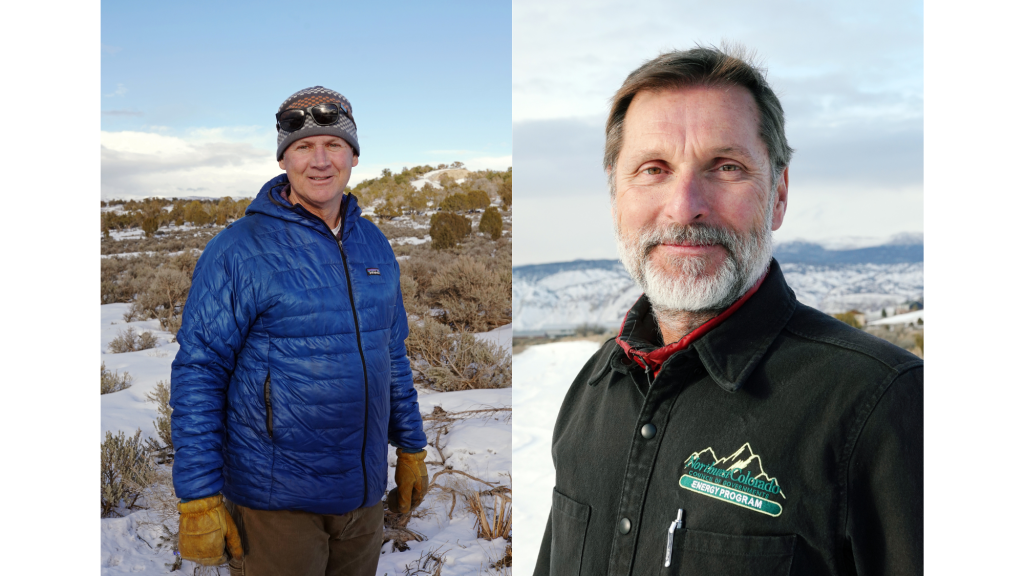
“My favorite part of the week during the pandemic was talking to John Gitchell (left) at Eagle County every week for six weeks.” – Doug Jones (right).
NWCCOG is based in Silverthorne, so even with local and state funding under its belt, the team needed to cultivate relationships with organizations that the community can trust. Emily Hoskins, outreach manager at NWCCOG, said that historically, outreach in the Dotsero and Gypsum communities had been difficult. But with diligent and intentional outreach, especially in collaboration with Holy Cross Energy and Walking Mountain Science Center, they saw an increase in participation in BEECH. Their partnerships with local organizations brought more awareness, involvement, and demand into the community. Additionally, the Mobile Intercultural Resource Alliance (MIRA) bus, a local resource that visits the Dotsero Mobile Home Park on a regular basis to bring medical, financial, and cultural resources to members of the community, helped make key connections.
“We partnered with MIRA for outreach which was essential in helping to cultivate trust and transparency,” Emily said.
The mobile home community is burdened with high energy costs. Emily explained how valuable it is to work with people outside of their agency on reaching more clients, so they could help people save money with no cost or investment to them. “It made it easier for us to hone in on that fact – like ‘Wow, we can really do some good here,’” she said.
The collective efforts amongst county, regional, and state entities has proven its worth – NWCCOG has already installed about 30 heat pumps throughout their territory over the course of two years and aims to do 20 more this year. The average, annual utility savings already seen in the first three homes that went fully electric has been roughly $600.
Lorena Lopez, a wife and mother of three, received beneficial electrification services through BEECH. Her husband works construction while she stays home. Although living in the park has been the most affordable option for Lorena and her family for 21 years, it has always felt uncomfortably cold in their home.

Lorena’s fan hangs above which received new LED light fixtures as part of the BEECH retrofit.
Space heaters in Lorena’s bathroom to keep it warm.
Lorena Lopez in her home, March 2023.
Lorena learned about BEECH from another neighbor. She feels the entire process was made easy. It was as simple as signing up and getting connected to NWCCOG. Retrofits are scheduled after qualified participants are put on a wait list until all the materials can come in. Any beneficial electrification upgrades are scheduled after weatherization updates are completed for clients like Lorena who are good candidates for those services.
Lorena’s duct work was pulled out which is why the mini split system was installed instead. It covers most of her home and Lorena said that all the work is appreciated even if she still needs a plug-in space heater in the bathroom where it still tends to be the coldest. But overall, she thinks the program is helpful and has improved her and her family’s quality of life and she is thankful for the assistance.
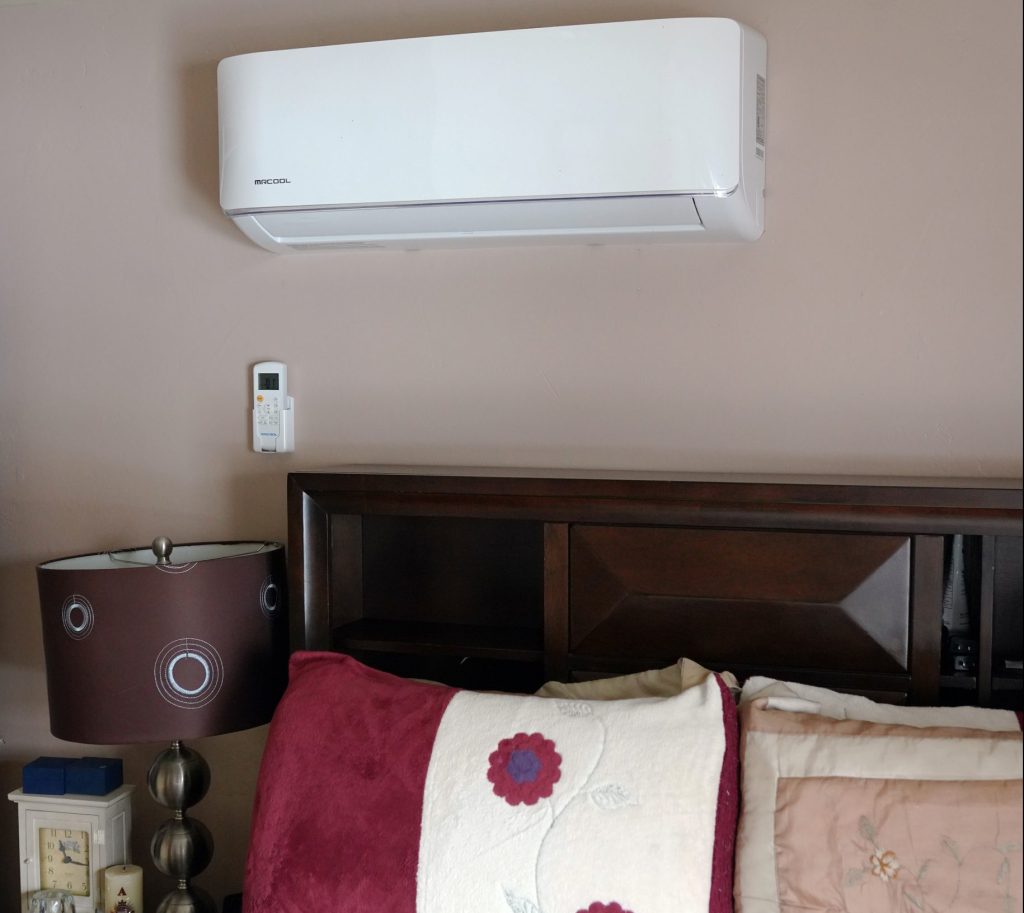
One of three mini splits in the Lopez family’s home.
The first Habitat for Humanity house built in Eagle County is occupied by a resident named Sandra who has lived there since 1996. When her furnace died and was replaced with a similar unit, her house remained far too cold to be comfortable. Luckily, because she benefited from the Low-income Energy Assistance Program, Emily Hoskins at BEECH was able to contact Sandra about their program.
Her house still operates on natural gas, but NWCCOG spent over a week doing insulation to help reduce her costs. They also installed a range hood above her stove which takes the byproducts of combustion out of the home. “We still can make it a healthier home even if beneficial electrification can’t be done,” Doug explained. “Those fixes still improve the air quality in the living space.”
“I’m very grateful for the project. I’m more content, I’m warmer, and the crew has gone above and beyond. They always communicate what is going on to me which makes me feel better knowing what is happening with my home,” Sandra said.

Wiring for the range hood above the stove is installed.
Julian Gonzalez works on setting up the range hood in Sandra’s home.
Crew members Gonzalez and Tony Alvarado and Julian work on Sandra’s home. (March 2023)
Damari Barrios, 23, is a mother of two. Her husband works in construction while she works at a rental car agency at Eagle County Regional Airport. Damari grew up in the mobile home community in Dotsero but she and her husband relocated into a one bedroom house in the town of Gypsum. As they began their family, they realized that they needed more space. They moved back into the Dotsero park during the summer which she says was brutal without air conditioning. Her mother was the one who told Damari to apply for BEECH, and she submitted her application through the MIRA bus.
Damari was with her family in Mexico when she got the call to do work on her home. They saved her spot in the program until she returned a few months later. Damari received a heat pump, a new heat pump water heater, and an induction cooktop. She loves the water heater because she can always be guaranteed a hot shower and overall she has seen her gas and heating become a little less expensive. Her electric and heating bills are still substantial but are more affordable than they were, and the heating and cooling system works more efficiently and makes her home more comfortable.

Damari Barrios with her son and daughter at home.
The Barrios family has a brand new induction stove top in their home.
The heat pump system for Damari and her family.
Weatherization assistance allows energy auditors like Justin Wiseman to model upgrades using a software that measures the savings-to-investment ratio. Justin described that various factors go into the model, including the utility provider, the location, and the home’s current insulation levels. “I truly love my job. It makes a big difference.” Justin said. “I enjoy helping people, it’s super gratifying going out there improving people’s homes.
When it came to creating BEECH, Justin was tasked with doing the research, coming up with ideas, tracking down products, and learning as much as he could. With the help of job shadowing and YouTube, he went from having hardly any HVAC experience to feeling confident in installing heat pumps and training others to do so.
That brings up one of the biggest obstacles to energy efficiency and heat pump retrofits right now: the lack of a trained local workforce. Everyone working in this field agrees – weatherization is hard work. Understanding and generating a pathway to field jobs for agencies is a goal for NWCCOG, the CEO, and Eagle County. Weatherization is tough to contextualize and explain to prospective workers, so it’s important to continue a program that is accessible for and easily understood by communities that are served.
“I think the success of BEECH in large part is because of NWCCOG and Doug’s vision, drive, and personal and professional passion,” Stephanie said. “He’s the one who’s led the charge as project manager. We’re happy to be part of the conversations, but we’re really just here as a funder. I tell all my agencies we want to support them however they need.”
“It takes drive, innovation, and influence to inspire other communities to take the leap and pursue similar projects,” Doug said. “We have people willing to do more work so we can serve more people. It’s tough work – the dedicated staff is what keeps me going.”

